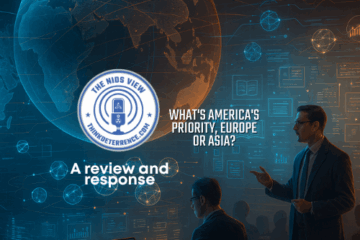As the 2024 presidential election looms, the future of American national security policy, particularly its nuclear posture, is under scrutiny. Whether Donald Trump reclaims the White House or Vice President Kamala Harris steps into the Oval Office, one issue should remain constant: the United States must unambiguously reject a nuclear no-first-use policy. Regardless of the moral or ethical debates surrounding the use of nuclear weapons, the strategic logic underpinning this is essential for maintaining American credibility, deterring adversaries, and ensuring global stability.
The Role of First Use in Deterrence
American nuclear posture has long relied on an ambiguous first-use policy to enhance deterrence. Unlike a no-first-use policy, which commits a country to only retaliate in response to a nuclear attack. Ambiguity forces adversaries to consider the possibility that any aggression could provoke a devastating nuclear response, even in a non-nuclear conflict.
Today, the US faces a diverse array of threats from state and non-state actors, including revisionist powers like China and Russia, nuclear-armed rogue states like North Korea, and potential proliferators like Iran. The credibility of the American nuclear deterrent is critical in this environment. A first-use option deters conventional aggression from adversaries who may believe that their superior non-nuclear forces could overwhelm the US or its allies without triggering a nuclear response. If the US were to adopt a no-first-use policy, adversaries could be emboldened, believing they can engage in limited conflicts or conventional escalations without risking catastrophic consequences.
Credibility of Use
Nuclear deterrence rests not only on the existence of weapons but also on the belief that they will be used, if necessary. The credibility of the American nuclear deterrent, therefore, depends on a consistent and robust posture that leaves room for ambiguity. Even if morally troubling, this ambiguity serves to keep adversaries in check.
Credibility is essential in preventing both conventional and nuclear conflicts. The US must signal that it is willing to escalate when necessary, ensuring that adversaries believe they have no safe avenues to challenge American power. Both Moscow and Beijing are expanding their military capacities, with the Russian nuclear arsenal modernized and China rapidly growing its arsenal. Without the possibility of nuclear first use, these powers might test American resolve in regions like Eastern Europe, Taiwan, or the South China Sea, believing that Washington is reluctant to escalate.
This is where critics often misunderstand the moral and ethical dimensions of nuclear deterrence. A no-first-use policy may appear more humane, but by removing the strategic ambiguity that underpins deterrence, it risks emboldening adversaries to start conflicts that could spiral out of control. Paradoxically, maintaining a first-use option can be the best way to prevent nuclear war by ensuring adversaries never push the US into a corner where nuclear retaliation becomes necessary.
Continuity across Administrations
Regardless of who wins the November election, as Matthew Costlow noted, continuity in nuclear policy is essential for maintaining credibility. The US has had a bipartisan consensus on maintaining nuclear deterrence since the dawn of the atomic age. Both Republican and Democrat administrations preserved the first-use option because they recognize the value of strategic ambiguity in deterring aggression.
A Trump administration might be inclined to preserve a muscular nuclear posture to project strength, while a Harris administration might come under pressure from progressives to move towards a no-first-use policy—aligning with global disarmament movements. However, any shift towards no first use would erode the credibility of US commitments to allies in Europe, Asia, and the Middle East. The North Atlantic Treaty Organization (NATO), in particular, relies on the American nuclear umbrella, and a no-first-use policy could cause allies to question Washington’s willingness to respond to conventional or nuclear threats. Such a policy could cause a cascading effecting of nuclear proliferation amongst our allies and adversaries.
Moreover, a shift in policy during an administration change could create instability by signaling to adversaries that US nuclear posture is fluid and negotiable, making deterrence less effective. Credibility in nuclear deterrence is not just about weapons but also about long-term consistency and resolve, which are crucial in managing the expectations of allies and adversaries alike.
Moral and Ethical Considerations
The moral and ethical dilemmas posed by nuclear weapons are undeniable. The catastrophic humanitarian consequences of nuclear use make it tempting to adopt a policy that seeks to limit the circumstances under which such weapons might be employed. But the ethics of deterrence also hinge on preventing war in the first place. If the fear of nuclear first use keeps adversaries from initiating conflicts that could escalate into full-scale war, then the policy serves a larger ethical purpose: preserving peace.
In the real world of international politics, where states act for self-interest and survival, moral purity often clashes with pragmatic necessities. Nuclear deterrence, including the first-use option, is a grim but necessary strategy for ensuring peace and stability in a world still defined by competition among great powers.
Conclusion
As the 2024 election approaches, the future of American nuclear policy should be beyond partisan politics. The US must maintain its nuclear first-use policy regardless of which administration takes office, whether led by Donald Trump or Kamala Harris. The strategic logic of deterrence, the credibility of use, and the need to prevent adversary aggression all argue for preserving this policy. While the moral and ethical concerns surrounding nuclear weapons are valid, the preservation of peace and the deterrence of large-scale conflicts depend on maintaining the ambiguity that has underpinned nuclear strategy for decades. A stable and secure world requires that the US continue to hold the line on its nuclear posture—now and in the future.
Aaron Holland is a PhD candidate at the University of Utah and an analyst at the National Institute for Deterrence Studies.
About the Author

Aaron Holland
Aaron Holland is an Analyst at the National Institute for Deterrence Studies.





Aaron Holland has written another clear and cogent essay about a critically important issue. Kudos! I would please like here to simply reinforce Aaron’s very complete discussion: The subject of no-first-use can be confusing, even seductive to laymen, and soon-to-be-Dr. Holland’s concise article very efficiently and pointedy overviews the sound & compelling reasons to continue to REJECT the very idea — let alone the policy for America — of no first use. Some related talking points are these: (1) The value and importance of Strategic Ambiguity goes back at least to Henry Kissinger’s early writings on nuclear deterrence and warfighting. (2) No first use as a policy by ANY nuclear-armed and authoritarian country is unlikely to hold up under pressure of any sort of war which is escalating and which that country is losing. (3) Russia’s “escalate to win” doctrine utterly negates the thought of the U.S. adopting no first use. (4) Russia’s relentless and ruthless malign influence campaign to heighten “nuclear psychosis” in the U.S. is very probably supporting and even funding “progressive” support of no first use. (5) Brutal and even genocidal aggression by the CRINKs in hot spots worldwide, combined with their repeated violation of nuclear treaties and their rejection of nuclear arms control, in my mind negates the very idea of America weakening our nuclear posture in this way — or in any other way. (6) As other commentators have said for some time, methinks it clear that China’s claiming no first use is just disingenuous propaganda; China has a strategic culture of lying through their teeth to lull and disarm their adversaries.